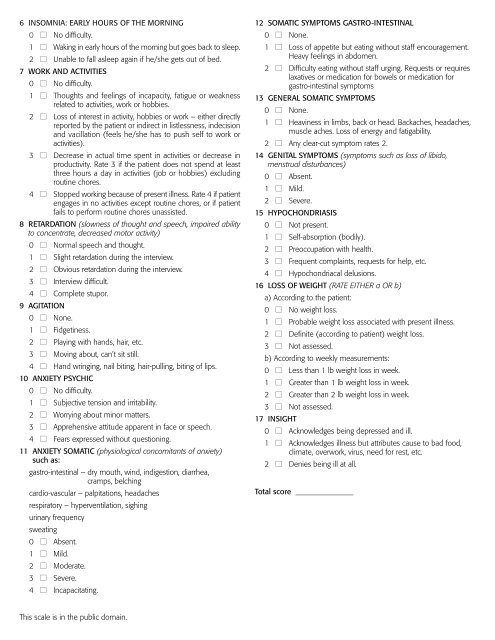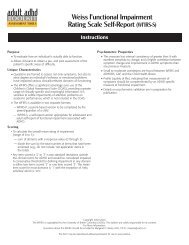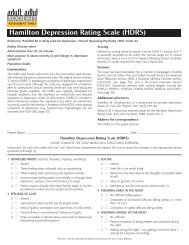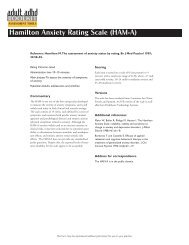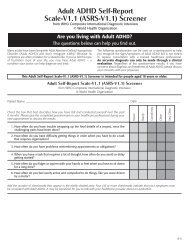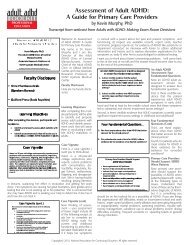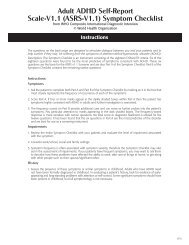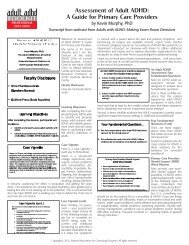A Resource for Clinicians - National Association for Continuing ...
A Resource for Clinicians - National Association for Continuing ...
A Resource for Clinicians - National Association for Continuing ...
Create successful ePaper yourself
Turn your PDF publications into a flip-book with our unique Google optimized e-Paper software.
6 INSOMNIA: EARLY HOURS OF THE MORNING0 ■ No difficulty.1 ■ Waking in early hours of the morning but goes back to sleep.2 ■ Unable to fall asleep again if he/she gets out of bed.7 WORK AND ACTIVITIES0 ■ No difficulty.1 ■ Thoughts and feelings of incapacity, fatigue or weaknessrelated to activities, work or hobbies.2 ■ Loss of interest in activity, hobbies or work – either directlyreported by the patient or indirect in listlessness, indecisionand vacillation (feels he/she has to push self to work oractivities).3 ■ Decrease in actual time spent in activities or decrease inproductivity. Rate 3 if the patient does not spend at leastthree hours a day in activities (job or hobbies) excludingroutine chores.4 ■ Stopped working because of present illness. Rate 4 if patientengages in no activities except routine chores, or if patientfails to per<strong>for</strong>m routine chores unassisted.8 RETARDATION (slowness of thought and speech, impaired abilityto concentrate, decreased motor activity)0 ■ Normal speech and thought.1 ■ Slight retardation during the interview.2 ■ Obvious retardation during the interview.3 ■ Interview difficult.4 ■ Complete stupor.9 AGITATION0 ■ None.1 ■ Fidgetiness.2 ■ Playing with hands, hair, etc.3 ■ Moving about, can’t sit still.4 ■ Hand wringing, nail biting, hair-pulling, biting of lips.10 ANXIETY PSYCHIC0 ■ No difficulty.1 ■ Subjective tension and irritability.2 ■ Worrying about minor matters.3 ■ Apprehensive attitude apparent in face or speech.4 ■ Fears expressed without questioning.11 ANXIETY SOMATIC (physiological concomitants of anxiety)such as:gastro-intestinal – dry mouth, wind, indigestion, diarrhea,cramps, belchingcardio-vascular – palpitations, headachesrespiratory – hyperventilation, sighingurinary frequencysweating0 ■ Absent.1 ■ Mild.2 ■ Moderate.3 ■ Severe.4 ■ Incapacitating.12 SOMATIC SYMPTOMS GASTRO-INTESTINAL0 ■ None.1 ■ Loss of appetite but eating without staff encouragement.Heavy feelings in abdomen.2 ■ Difficulty eating without staff urging. Requests or requireslaxatives or medication <strong>for</strong> bowels or medication <strong>for</strong>gastro-intestinal symptoms13 GENERAL SOMATIC SYMPTOMS0 ■ None.1 ■ Heaviness in limbs, back or head. Backaches, headaches,muscle aches. Loss of energy and fatigability.2 ■ Any clear-cut symptom rates 2.14 GENITAL SYMPTOMS (symptoms such as loss of libido,menstrual disturbances)0 ■ Absent.1 ■ Mild.2 ■ Severe.15 HYPOCHONDRIASIS0 ■ Not present.1 ■ Self-absorption (bodily).2 ■ Preoccupation with health.3 ■ Frequent complaints, requests <strong>for</strong> help, etc.4 ■ Hypochondriacal delusions.16 LOSS OF WEIGHT (RATE EITHER a OR b)a) According to the patient:0 ■ No weight loss.1 ■ Probable weight loss associated with present illness.2 ■ Definite (according to patient) weight loss.3 ■ Not assessed.b) According to weekly measurements:0 ■ Less than 1 lb weight loss in week.1 ■ Greater than 1 lb weight loss in week.2 ■ Greater than 2 lb weight loss in week.3 ■ Not assessed.17 INSIGHT0 ■ Acknowledges being depressed and ill.1 ■ Acknowledges illness but attributes cause to bad food,climate, overwork, virus, need <strong>for</strong> rest, etc.2 ■ Denies being ill at all.Total score _______________This scale is in the public domain.


